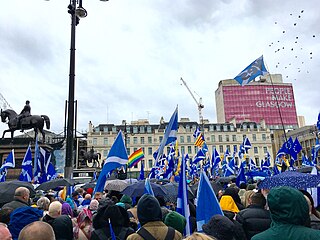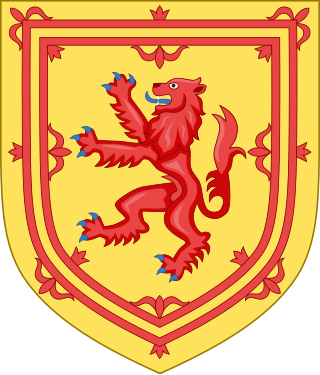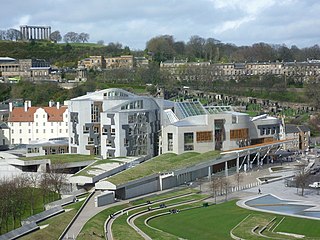Related Research Articles

Scottish independence is the notion of Scotland as a sovereign state, independent from the United Kingdom, and refers to the political movement that is campaigning to bring it about.
James Sillars is a Scottish politician and campaigner for Scottish independence. Sillars served as a Labour Party MP for South Ayrshire from 1970 to 1976. He founded and led the pro-Scottish Home Rule Scottish Labour Party in 1976, continuing as MP for South Ayrshire until he lost the seat in 1979.

Alistair Maclean Darling, Baron Darling of Roulanish, is a British politician who served as Chancellor of the Exchequer under Prime Minister Gordon Brown from 2007 to 2010. A member of the Labour Party, he was a Member of Parliament (MP) from 1987 until he stepped down in 2015, most recently for Edinburgh South West.

James Francis Murphy is a Scottish former politician who served as Leader of the Scottish Labour Party from 2014 to 2015 and Secretary of State for Scotland from 2008 to 2010. He was Member of Parliament (MP) for East Renfrewshire, formerly Eastwood, from 1997 to 2015. He identifies as a social democrat and has expressed support for a foreign policy of Western interventionism. He has been described as being on the political right of the Labour Party.

Unionism in Scotland is a political movement which favours the continuation of the political union between Scotland and the other countries of the United Kingdom, and hence is opposed to Scottish independence. Scotland is one of four countries of the United Kingdom which has its own devolved government and Scottish Parliament, as well as representation in the UK Parliament. There are many strands of political Unionism in Scotland, some of which have ties to Unionism and Loyalism in Northern Ireland. The two main political parties in the UK — the Conservatives support Scotland remaining part of the UK.

Johann MacDougall Lamont is a Scottish Labour Co-operative politician who served as Leader of the Scottish Labour Party from 2011 to 2014. She was previously a junior Scottish Executive minister from 2004 to 2007 and Deputy Leader of the Scottish Labour Party from 2008 until her election to the leadership in 2011. In addition to her ministerial and leadership roles, she has been a campaigner on equality issues and violence against women throughout her political career.

Scottish Labour is a social democratic political party in Scotland. It is an autonomous section of the UK Labour Party. From their peak of holding 56 of the 129 seats at the first Scottish parliament election in 1999, the Party has lost seats at each Holyrood election, returning 22 MSPs at the 2021 election. The party currently holds one of 59 Scottish seats in the UK House of Commons, with Ian Murray having represented Edinburgh South continuously since 2010.
In Scotland, the Scottish Socialist Party (SSP) is a left-wing political party. The party was formed in 1998 from an alliance of left-wing organisations in Scotland. In 1999, it saw its first MSP returned to Holyrood, with five more MSPs elected in 2003. It lost all MSPs in the 2007 elections and has lacked representation in the Scottish Parliament ever since.

Devolution is the process in which the central British parliament grants administrative powers to the devolved Scottish Parliament. Prior to the advent of devolution, some had argued for a Scottish Parliament within the United Kingdom – while others have since advocated for complete independence. The people of Scotland first got the opportunity to vote in a referendum on proposals for devolution in 1979 and, although a majority of those voting voted 'Yes', the referendum legislation also required 40% of the electorate to vote 'Yes' for the plans to be enacted and this was not achieved. A second referendum opportunity in 1997, this time on a strong proposal, resulted in an overwhelming 'Yes' victory, leading to the Scotland Act 1998 being passed and the Scottish Parliament being established in 1999.

A referendum on Scottish independence from the United Kingdom was held in Scotland on 18 September 2014. The referendum question was, "Should Scotland be an independent country?", which voters answered with "Yes" or "No". The "No" side won with 2,001,926 (55.3%) voting against independence and 1,617,989 (44.7%) voting in favour. The turnout of 84.6% was the highest recorded for an election or referendum in the United Kingdom since the January 1910 general election, which was held before the introduction of universal suffrage.
Yes Scotland was the organisation representing the parties, organisations, and individuals campaigning for a Yes vote in the 2014 Scottish independence referendum. It was launched on 25 May 2012 and dissolved in late 2014 after Scotland voted against independence.
Better Together was the principal campaign for a No vote in the 2014 Scottish independence referendum, advocating Scotland continuing to be part of the United Kingdom. The organisation was formed in June 2012, operating until winning the vote on the referendum's polling day on 18 September 2014 with 2,001,926 (55.3%) voting against independence and 1,617,989 (44.7%) voting in favour. In June 2014, the campaign adopted a No Thanks branding, in relation to the referendum question.

Labour for Independence was a political organisation for Scottish Labour supporters that were in favour of Scottish independence. It claimed to have 2,000 members across Scotland in June 2014. The organisation had been described as an "SNP front" and, following the September 2014 independence referendum, its founder Allan Grogan joined the Scottish Socialist Party.

National Collective was a political organisation self-described as an "open and non-party [...] group of artists and creatives" who support Scottish independence active from 2011 to 2015. The organisation was founded in late 2011 by Ross Colquhoun, Andrew Redmond Barr and Rory Scothorne with the goal of "[helping to] shape the vision of a new society and nation". The group argued that independence for Scotland could achieve both a realisation of self-determination and a "cultural dawn" for the nation. The organisation was supported by independence-minded artists, including Liz Lochhead, Alasdair Gray, Elaine C. Smith and Karine Polwart.
Events from the year 2014 in Scotland.

The Scottish Socialist Party is a left-wing political party campaigning for the establishment of an independent socialist Scotland.
This page lists the public opinion polls that were conducted in relation to the 2014 Scottish independence referendum, that was held on 18 September 2014. Overall, polls showed that support for a "No" vote was dominant until the end of August 2014, when support for a "Yes" vote gained momentum and the gap closed significantly, with at least one poll placing the "Yes" vote ahead. In the final week of the campaign, polls showed the "No" vote to be consistently but somewhat narrowly ahead. There were no exit polls although a YouGov post-election poll was published shortly after the polls closed. For the history of the campaign itself see 2014 Scottish independence referendum, Yes Scotland, and Better Together (campaign).
Cybernat is a term used in the media of the United Kingdom to refer to online supporters of Scottish independence and the Scottish National Party.

Scotland in Union (SIU) is a pro-UK campaign group, based in Scotland, which launched in March 2015 to help keep Scotland within the United Kingdom. Its supporters include members of pro-UK political parties and people with no party affiliation. It is Scotland's largest and most active pro-UK campaign group, with 36,000 signed up supporters.
References
- ↑ "Scottish independence: Former PM Gordon Brown wants a 'union for social justice'". BBC News. 13 May 2013. Retrieved 14 May 2013.
- 1 2 "Brown joins launch of Labour campaign to preserve Union". 13 May 2013. Retrieved 14 May 2013.